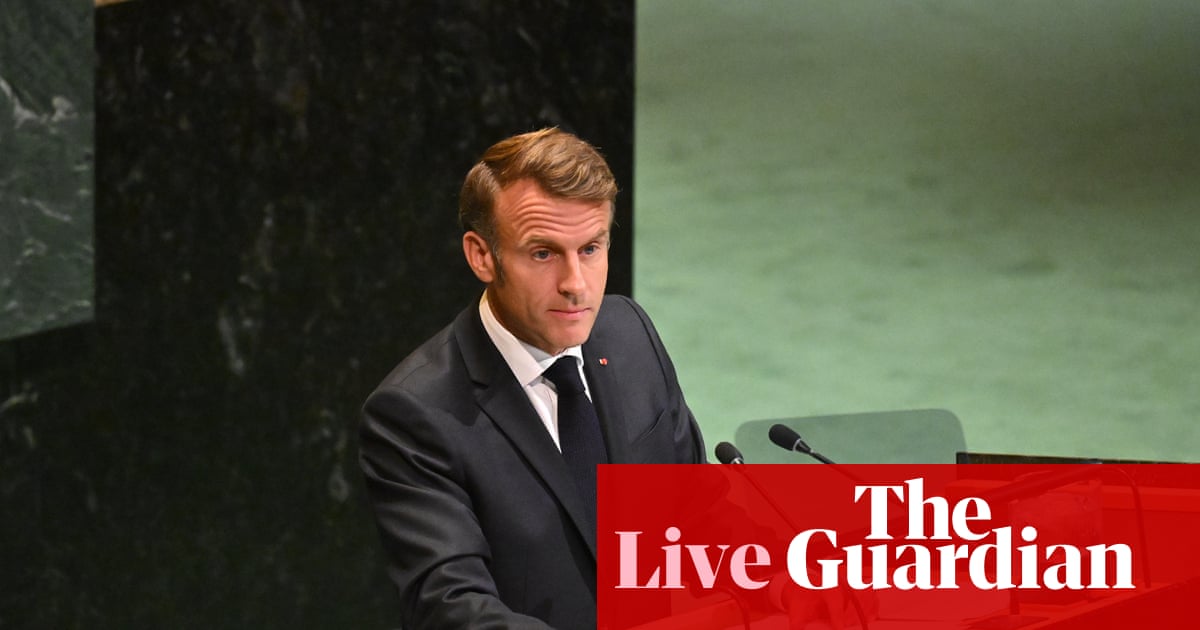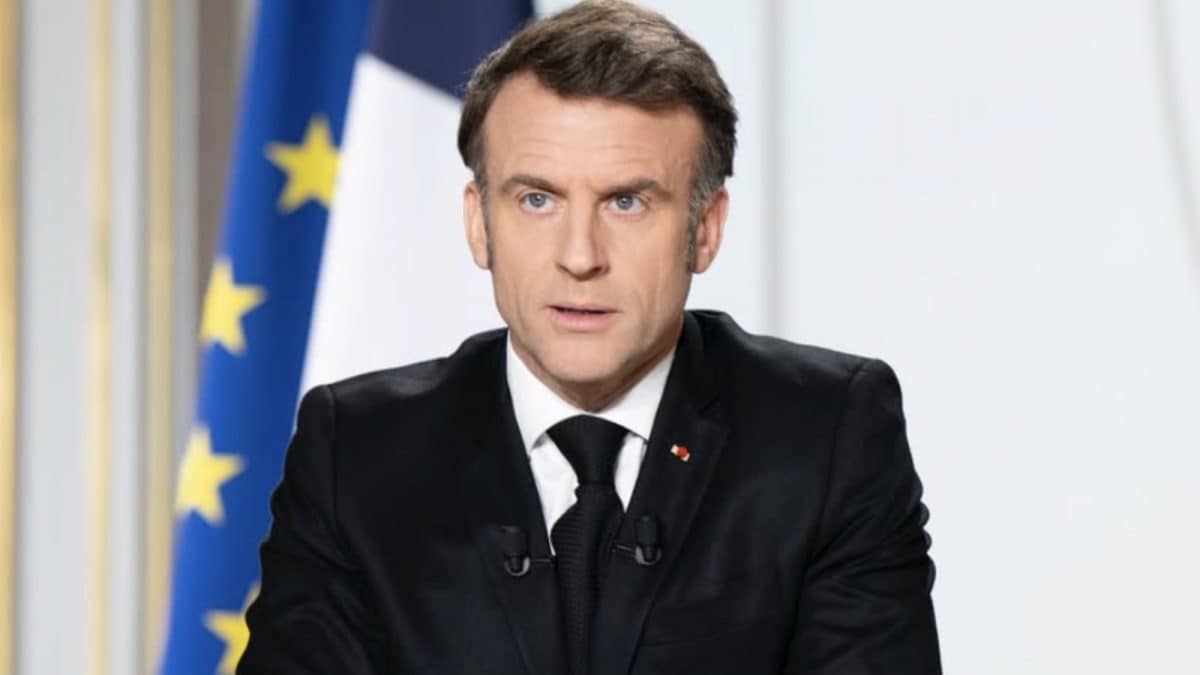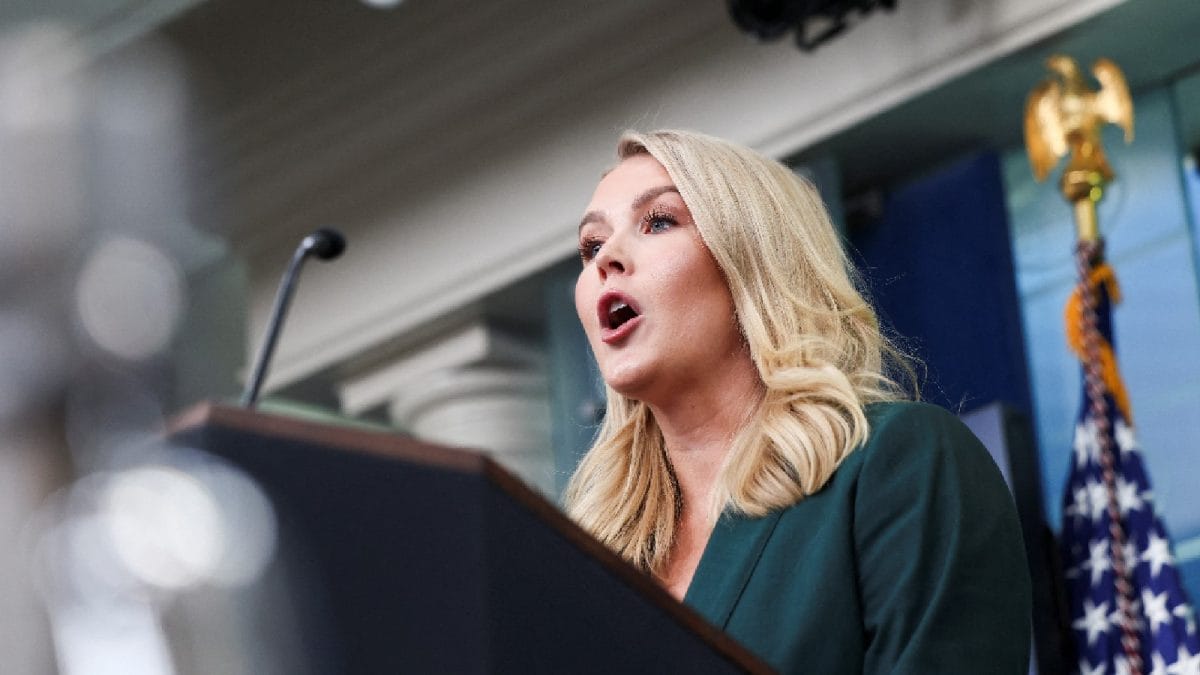Emmanuel Macron has announced France’s official recognition of the State of Palestine, setting out a plan for a UN-mandated international stabilisation force in postwar Gaza that is expected to find support in many countries but not in Israel or the US.
“The time has come to end the war in Gaza, the massacres and the death,” Macron said during a speech opening a special summit in the United Nations general assembly hall on Monday evening. “The time has come to do justice for the Palestinian people and thus to recognise the State of Palestine in Gaza, the West Bank and Jerusalem.”
The statements drew cheers and standing ovations from some in the hall, but the session was not attended by the US and Israeli officials dismissed the initiative.
Meanwhile, Arab and Muslim leaders are set to meet Donald Trump in New York to discuss their separate plan for a stabilisation force in Gaza as France joined the UK, Canada and Australia in recognising Palestine as a state.
The recognition of Palestine by France and five other states played out in dramatic fashion later on the floor of the UN general assembly as France and Saudi Arabia co-chaired a summit to discuss the future of a two-state solution, a road map to peace that Benjamin Netanyahu has declared a dead-end.
António Guterres, the UN secretary-general, said in a speech that statehood was a “right, not a reward” for Palestinians.
“Nothing can justify the horrific 7 October terror attacks by Hamas or the taking of hostages,” he said. “And nothing can justify the collective punishment of the Palestinian people.”
Israel’s UN ambassador, Danny Danon, derided the session as an “embarrassing political circus” and the US has warned its allies that the recognition of Palestine could lead to a “reciprocal” Israeli reaction, setting the scene for a major diplomatic crisis as world leaders meet in New York for the 80th anniversary of the UN.
Israel has warned that it might respond to the recognition of Palestine by annexing the West Bank, citing claims from Hamas that recognition by allies of Israel was a victory for the terror group.
“Nothing can also excuse developments in the West Bank that pose an existential threat to a two-state solution,” said Guterres. “The relentless expansion of settlements, the creeping threat of annexation, the intensification of settle violence – all of it must stop.”
France has said the plan for a stabilisation force would marginalise Hamas by disarming the group and excluding it from power.
The proposal includes a UN-mandated force to provide security in Gaza as well as oversee the disarmament of Hamas and help train a Palestinian Authority (PA) police force.
graphicThe diplomatic scramble played out in New York as Israel intensified its assault on Gaza City on Monday, with reports of 37 Palestinians killed across the territory, including 30 in Gaza City. Israel launched an offensive in the city last week against what it said were 3,000 Hamas fighters hiding in the city, ignoring international humanitarian concerns.
The Arab League declared in July that Hamas must play no further role in governance, with power handed to a newly elected PA to govern Gaza, the West Bank and East Jerusalem. Hamas would be required to hand over its weapons to the authority.
The Trump meeting, scheduled after his address to the UN’s general assembly, is the most direct engagement between the White House and Arab states on post-ceasefire plans for Gaza since he was elected president for a second time.
Trump is expected to deliver an aggressive speech decrying “globalist institutions” on Tuesday, which he will claim have “have significantly decayed the world order”, a White House spokesperson said in a briefing.
West Bank mapThe US president is also expected to meet leaders from Turkey, the United Arab Emirates, Egypt, Qatar and Saudi Arabia. Nothing the president has done so far suggests that he shares the view held by the Gulf states that the PA is a viable alternative to Hamas, or should be considered a partner for peace. He has imposed sanctions on PA officials and banned Mahmoud Abbas, its 89-year-old leader, from coming to New York to speak to the UN.
Arab leaders see the meeting as a chance to pin down Trump on whether he supports the Arab League’s proposals for Gaza’s future, or even a variation put to him by a working group led by Tony Blair, the former UK prime minister, and Jared Kushner, who is the president’s son-in-law. Neither of the reconstruction plans proposes the mass expulsion of Palestinians, a proposal that Trump at times has appeared to support. The Blair plan does not clearly endorse the PA as the long-term administrators for Gaza.
The Arab states are likely to insist they will not join any international force unless the reformed PA is given a future role. They also want a roadmap to a two-state future that excludes further Israeli settlements or annexation of the West Bank.
The UK on Sunday recognised a Palestinian state provisionally based on the 1949 armistice border, or “Green Line”, between Israel, the West Bank and Gaza before their 1967 capture.
The PA, which exercises limited civic rule in the Israeli-occupied West Bank and was forced out of Gaza by Hamas in 2007, has said it was ready to govern Gaza and the West Bank with international support.
Benjamin Netanyahu, Israel’s prime minister, has insisted that Israel must retain overall security control alongside an Arab-led civilian administration. However, others in his rightwing coalition want to annex Gaza. Israel has driven the PA close to bankruptcy by withholding monthly revenue transfers.
Lana Nusseibeh, a minister at the UAE foreign affairs ministry, said annexation would be a red line for the UAE since “it would strike at the heart of what the Abraham accords are trying to achieve”. The UAE signed the accords – deals brokered by Trump to normalise relations between Israel and the Arab states – in 2020 in return for Israel not annexing the West Bank.
UAE leaders, bidding to present themselves as the startup nation of the future, did not suggest they would leave the accords but instead said plans for greater regional integration would become a dead letter.
The UK foreign secretary, Yvette Cooper, urged Israel not to respond to the new recognitions by annexing parts of the West Bank.
France’s foreign minister, Jean-Noël Barrot, said the recognition of a Palestinian state was a disavowal of Hamas since the plan called for its exclusion from any future role in the governance of Gaza. He pointed out that the general assembly had already endorsed a seven-page declaration this month outlining “tangible, timebound, and irreversible steps” toward a two-state solution, while also condemning Hamas and calling for it to surrender and disarm.
The German foreign minister, Johann Wadephul, said: “Any and all steps toward an illegal annexation of occupied territory also undermine the chances of resolving the conflict in a sustainable way. However distant it may seem at this moment, a negotiated two-state solution is the path that can enable both Israelis and Palestinians to live in peace, security and dignity. Germany regards recognition of a Palestinian state as a step more at the end of the process. However, such a process must now begin.”

 2 hours ago
2 hours ago


















